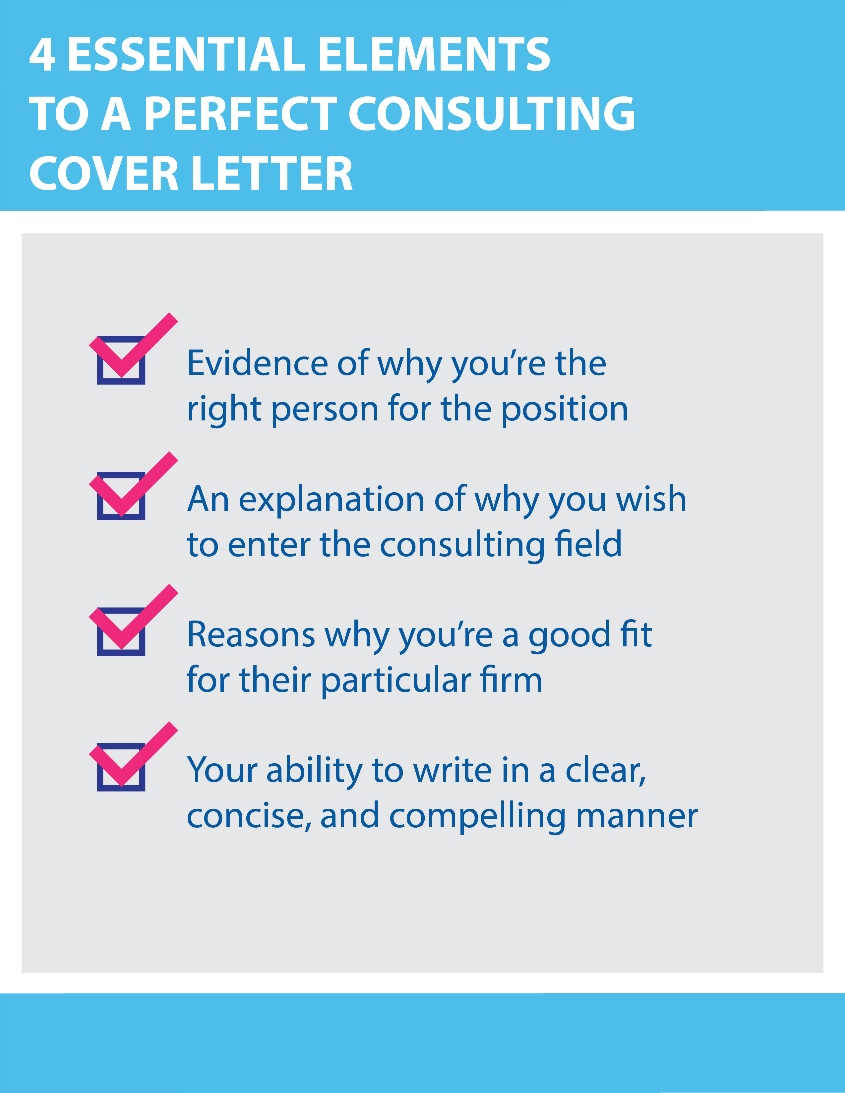FREE Resume Tips Email and Video Series
This form collects your name and email so that we can add you to our email list that delivers the free resources you are requesting. Check out our privacy policy for details on how we protect and manage your submitted data.
We’ll never spam you or share your email. Unsubscribe at any time.
Your cover letter can make a big difference when applying for a management consulting position. Because the cover letter is typically read before your resume, it plays an essential chronological role during the application process.
Consulting firms will typically read your cover letter to quickly identify what makes you different from thousands of other applicants. Therefore, writing a strong and unique cover letter can make you stand out from the competition and ensure that your achievements aren’t overlooked.
A strong cover letter presents an excellent opportunity for you to demonstrate why you’re the best candidate for the job, and to plead your case as to why the firm should hire you over other applicants.
This guide will cover 11 essential steps towards writing the perfect consulting cover letter.
Tip 1 — Know What Consulting Firms Are Looking For
The top consulting firms receive hundreds of thousands of applications each year. For example, McKinsey receives approximately 200,000 applications annually, of which only 2,000 applicants receive an offer. Consulting firms are faced with the arduous task of narrowing down the candidate pool to include only the best.
Interviewing candidates is not a cheap process. The firm wants to ensure that any candidate they interview is qualified for the position, is prepared for management consulting as a career, and is a good fit for the firm.
Therefore, top consulting firms look for four essential elements in a cover letter.
- Evidence of why you’re the right person for the position
- An explanation of why you wish to enter the consulting field
- Reasons why you’re a good fit for their particular firm
- Your ability to write in a clear, concise, and compelling manner

When reading cover letters, screeners will often ask,“Did the applicant spend enough time preparing a strong letter? Have they done their homework regarding the firm and the position in question? Do they have adequate writing skills to prepare compelling emails, reports, and presentations?“
A cover letter is a challenging document to prepare. You may feel worn out after spending hours on your resume, only to realize that you also need to spend as much time (if not more) on your cover letter.
Rather than looking at your consulting cover letter as an annoying extra step, think of it as an excellent opportunity to emphasize your skills and experiences and to set yourself apart from other applicants.
Tip 2 — Make Sure the Letter Has TheseFiveDistinct Sections
While your cover letter doesn’t need to take a formulaic approach, there are five distinct sections that should be covered. They are:
- An Introduction
The introduction should contain which position you’re applying for, your name, address, and contact information. It should also be short, sweet, and entertaining. Write it in such a way that the screener will want to keep reading into the second paragraph.
- Why You’re a Great Candidate
This is the section where you should blow your own horn. Each sentence should speak to your skills, education, and experiences — tying everything back to why you’re a great candidate. Ideally, this section should include your top three achievements to date (relevant to consulting, of course).
- Why Consulting is the Right Fit for You
Remember that the top priority of most consulting firms is to find out whether you’ll become a great consultant if hired. Even with memorable and unique qualifications, a recruiter may not be convinced that these skills will make you a good management consultant. To leave no doubt in their mind, dedicate a section towards explaining why you’re the right person for the job. You can use previous experiences (such as internships, jobs, or academic courses) to tie your career goals to the position in question.
- Why You’re Applying for the Position
The next section should cover why you chose to apply for this exact position in this firm. When laying out your case, identify unique reasons as to why you think McKinsey, Bain, BCG, Deloitte, or any other firm is your firm of choice. To make a compelling argument, identify specific people, reports, or projects that make your story believable. Don’t hesitate to mention specific employees or projects that caught your eye and sparked your interest.
- A Solid Conclusion
Finalize the letter by restating why you believe you’re a great candidate and how you can be of value to the company.
Tip 3 — LinkYour Cover Letter to Your Resume

A consulting cover letter is essentially an opportunity for you to expound on the information you wrote in your resume. What does this mean? It means that your cover letter should highlight the unique achievements, skills, and experiences (relevant to the position) that make you stand out from other applicants.
Your resume and cover letter should work hand in hand to strengthen your application further and demonstrate what makes you stand out.
Start off by identifying what you want the consulting firm to know about you. Draw attention to your career achievements. Maybe you started a business and sold it for a significant profit, or you worked overseas for a few years and have a diverse skillset.
Make sure that unique experiences are mentioned in the first few paragraphs of your cover letter to pique the interest of the resume screener.
Many resume screeners don’t actually read your entire resume.They simply scan it to identify specific items that make you stand out. Because resume screeners scan through hundreds of resumes at a time, they can easily overlook your unique achievements.
The cover letter is your opportunity to prevent this from happening. When you go into detail about achievements in your cover letter, you essentially draw the attention of screeners (and thus give yourself a better chance to land an interview).
Tip 4 — Don’t Forget About Your Resume
Even after referencing the unique skills you have in your cover letter, you need a strong consulting resume to back up your claims. A consulting resume is different from other standard template resumes, as it needs to emphasize a combination of skills that can make you successful as a consultant.
Here are resources that can help you prepare a strong consulting resume. A quality consulting resume will take just as much attention to detail as writing a strong cover letter will. In a nutshell, writing a consulting resume requires you to reflect on your past experiences, select the ones that are most relevant to consulting, and summarize them in a manner that resume screeners can easily scan and digest.
Top consulting firms typically look for the following in your resume:
- Big brand names (employers and schools)
- Strong academic performance (high GPA)
- Strong analytical skills (demonstrated in high standardized test scores)
- Strong leadership and communication skills
- Achievements versus career years (the longer your career is, the more achievements that screeners expect to see)

Also, refer to this resource to identify the top five mistakes that applicants make when writing a consulting resume.
Tip 5 — Avoid Using a Standard Template for Your Cover Letter
It’s no secret that it can be a pain to write a strong cover letter. It takes a lot of time and reflection. You’ll have to revise and edit the piece multiple times before submitting it. But, to truly stand out from other applicants, your letter needs to be interesting, personal, and unique.
The biggest mistake you can make is to copy a standard cover letter template and simply plug in your name and skillset. Screeners hate standard form letters because they’re boring to read, and they show that you’re unwilling to put in the necessary time and effort to write something unique. Because recruiters read thousands of cover letters, they can easily tell when a cover letter is written from a template.
When writing your consulting cover letter, make sure that every sentence is unique. While you may draw inspiration from various templates, add your personal twist to each word and modify it in a manner that emphasizes your unique skillset. For example, instead of starting with the usual format:
“Dear Sir/Madam, I write to apply for a consulting position….”
You can make things more interesting by starting off with what makes you different. Here’s an example:
“After attending Harvard for both my undergraduate and MBA education, I am confident in my ability to become successful as a [insert job position here] at McKinsey.”
Another example:
“My experiences overseas as a Peace Corps volunteer put me in a position to be successful as a [insert job position here] at BCG.”
The idea is to make every sentence in your cover letter count. Add a personal twist to all ofyour skills and experiences and tie them to the job responsibilities of the open position.
Tip 6 — Highlight Your Skills and Experiences via Evidence-Based Storytelling
In your cover letter, the goal should be to tell your story. Rather than simply listing your skills and abilities, demonstrate how various experiences have molded you into the perfect candidate for the position in question. Strive to show that you have what it takes, instead of telling.
For instance, instead of simply stating that you can lead, give a specific example of an experience where you showed leadership qualities. This evidence-based approach shows recruiters that your prior experiences have equipped you with the necessary skills to be successful.
Telling a story makes your cover letter much easier to read. It also makes you stand out from thousands of other applicants who may simply state “I’m a leader,” or, “I’m a hard worker.”
As you use this evidence-based approach, tailor every experience you mention to a specific skillset that is required for the job. If the position requires a candidate with strong interpersonal skills, explain a time when you worked within a team to achieve tangible results. Also, list out any challenges and how you overcame them.
It’s not simply about telling a story. Rather, it’s about telling a story that highlights why you’re a good fit for the job, as well as what makes you stand out from the competition.
Tip 7 — Show Your Value
A common mistake that many applicants make is to only think about personal achievements when applying for consulting positions. Recruiters often read through cover letters that have lots of “me meme” in them.
This is to say that many applicants focus on how they can benefit personally from the position in question, instead of demonstrating how they can become valuable employees (and eventually partners).
Many cover letters talk only about how the candidate will be able to elevate his/her career, experiences, and skills. Such letters only focus on personal goals instead of demonstrating how you can help the company become better. Remember that screeners are looking for candidates who will be of benefit to the firm, not those who are simply using this as an opportunity to enrich themselves and their careers.
When writing your cover letter, emphasize how your skillset will be of benefit to the company. To do this successfully, you need to do your research with regards to what the short-term and long-term goals of the firm are. You can then use these goals and relate them to your unique abilities and experiences.
Tip 8 — One Page Is the Perfect Length
It can be tempting to write a long cover letter, especially if you have a diverse skillset that you feel should be highlighted. However, being concise and keeping it relevant to the position is a much better strategy.
Aim to select only the most relevant experiences that apply directly to the position you’re seeking. You can typically fit these experiences in only one page.
Being concise also makes it easier for recruiters to read through your cover letter quickly without overlooking anything. Edit it down to a concise letter by re-reading and adjusting your original cover letter. The more you read it, the more unnecessary words and content you will find to take out.
Start early so that you can give yourself plenty of time to adjust your cover letter accordingly.
Tip 9 — Be Specific About the Position You’re Applying To
While this may sound obvious, many applicants tend to go off on a tangent about their skills and abilities without first mentioning the job they’re applying for. You should always state the position and office of the job you intend to apply for within the first sentence.
Remember that this information can still be included as you emphasize what makes you different. Here’s an example of an opening sentence that was used earlier in this guide:
“My experiences overseas as a Peace Corps volunteer put me in a position to be successful as a [insert job position here] at BCG.”
Being specific and concise about the job you’re applying for will make it easier for screeners to quickly recognize which position you are interested in.
Tip 10 — Give Yourself Time to Write a Quality Letter
Similar to consulting resumes, writing a strong consulting cover letter takes time. To be successful, you need to consider everything you’ve accomplished as well as what makes you different from everyone else. Don’t think that you can write a strong cover letter in one night. It requires multiple iterations, careful re-reading, and timely feedback.
You also need to make sure that the cover letter blends seamlessly with your resume, and it expounds on the outstanding skills and experiences contained in the resume itself.
Tip 11 — Proofread Thoroughly

And finally, make sure you eliminate any grammatical or spelling mistakes from the final cover letter. These mistakes make you appear careless and can result in being disqualified in the screening process. Don’t let something so simple be your downfall.
Take time to proofread. Ask peers and fellow professionals review your cover letter and give you feedback as well.
Example
Here is an example cover letter that highlights the tips I’ve mentioned. Reference this example as you write your cover letter to make sure that you hit all of the important sections. These items do not necessarily need to appear in the order I have them listed. But, make sure that they are all represented in your cover letter. Below is an example consulting cover letter.
You can also download the example by clicking here.

More Resources:
Free Case Interview Prep Program – Sign Up For Free Instant Access to the Largest Collection of FREE Case Interview Training Resources.
We’ll never spam you or share your email. Unsubscribe at any time.




219 thoughts on “Consulting Cover Letter Tips (and Template)”
Hi Victor,
You and your website are awesome; thank you for all you provide the community.
I graduated in the top 5% of my class at a small college (degree in chemistry; gpa 3.97/4.0). I worked in IT consulting for a MNC, that’s recognized for IT consulting but not general management consulting. Then I worked at a dynamic healthcare startup doing analytics and business analysis work. I’m finishing my MSc in Public Health Research at one of the best health/medical schools in the world, and I’m applying for a Mckinsey Healthcare Analytics position in the London and DC offices.
I keep see you mentioning strong quant skills- i.e. gmat scores and SAT scores. As I didn’t go to business school (but still aspire to at some point!), I didn’t take the GMAT; my university, while prestigious, didn’t require the GRE either, as it’s European.
Q: I did well on my SAT math section (720-760 or something… would have to check). Is this something I should list on my resume and/or cover letter? While it’s a good score, I’ve been working nearly 5 years since my undergrad and also am now completing my MSc…
Best,
D
Danielle,
Yes include you SAT scores and be sure to split out the math sub score as well.
Victor
Hey Victor,
That was a very insightful article! Thanks for sharing the inside knowledge!
I just got rejected from a top boutique European Strategy Consulting firm (Dubai Office) after an interview with the MD and a case study. I am currently working as a Business Development Manager for a SME in Dubai. I have close to 2 years of experience in Business Development, Sales and Strategy.
I have an executive Master’s degree (not MBA) with a 3.1 GPA from a top tier B-School in Europe. I also have a Bachelors in Mechanical Engineering (Second Class Honours) from a top ranked university in the United Kingdom.
I have been casually applying for jobs in consulting. After the rejection, I am seriously considering to get my hands dirty and land a consulting job by the beginning of 2016.
What firms do you think I should target in the Middle East and Canada ? What kind of firms would be interested in my profile? What type of consulting?
I have work permits for both these regions. I am 23 years old, and have no gaps on my CV. I am targeting mainly experienced roles due to my low academic scores. I have had big clients in the Middle East, and have worked on 2 relevant academic projects such as a Big data Analysis of Brain Signals and a Cyber Security Strategy project.
My language skills are limited to English, French and Hindi. I have also been a Competitive Swimmer at the regional level in the Middle East.
I am also working on certifications in Cloud Computing and Cryptography. I have pretty decent computing language skills (JAVA, C , Matlab) and relevant IT & BI skills except open source coding (Python, R), which I am planning to develop soon.
Sorry for the questions, but, I need some pro advice at the moment to set me in the right direction.
Have a great day,
Kevin
Hi Victor,
As many others I have a question too. Maybe it’s not really in your field, but I’ll give it a try. I’ve got my bachelor in 2004, finished my research master in developmental psychology in 2006 and from 2007 to 2011 I have worked as researcher at a University (in the Netherlands). While working there I have almost (and the key word here is almost) completed a phd. For a series of personal reasons after my last appointment I abandoned the academic scene for a few years, I have quite a gap on my cv, and now I want to go back and either find another phd position, or at least a research position in my field. In the past years I had a few other jobs that have no relevance at all, and actually could be seen as pretty low status in the eye of some snobbish academic professors. Now I’m applying to this type of positions and I’m likely running against fresh out of master candidates, with less experience than me, but with a more linear curriculum and work/life trajectory.
My question is: Do I address the elephant in the room? Shall I say something about my “lost” years? And in case I should, how exactly? I keep on hearing suggestions on how to avoid mentioning anything even remotely negative, but in this way I feel the gap on my curriculum will speak louder than anything else I have actually accomplished. I’m afraid that with no explanation they would just assume the worse.
Thank you very much in advance.
Christa,
If more than 90% of readers would notice the gap, and more than 90% would wonder about it or think negatively about it, I recommend proactively addressing it in a cover letter. You can frame it in as positive a light as possible. When we resume readers see something missing of a resume or CV, we tend to assume the worst. We have very good imaginations. In most cases, you reality will make you look better (or less worse depending on your perspective) that our imaginations.
Victor
completed*
Hi Victor,
First of all, I just recently started reading your book (Case Interview Secrets) and it is brilliant! You’ve made everything so very clear and simple to understand.
I have an interesting situation and I would really appreciate your guidance.
I am an international candidate and I completely my bachelors (Majors in Marketing and Minors in Media studies) from a top tier university in my home country (in South East Asia). I graduated with a CGPA of 3.62 (Majors GPA: Above 3.9 & Finance GPA: 4.0) and I held three undergraduate merit scholarships for scoring a 4.0 (perfect) GPA in three semesters. However my university is not a target school.
I am extremely passionate about a career in Strategy Consulting at a top tier firm such as Bain, McKinsey or Strategy& (formerly Booz and Company) and I have been invested in preparing myself for a role in one of those firms.
Since my graduation last august (2014) I’ve completed six months of Project Internship at Nestle in the Marketing and Nestle Continuous Excellence departments. I wanted to focus on achieving results and building my strategy developing and leadership skills hence during my experience I ended up leading several initiatives such as forming, training and leading a team of Management trainees in a highly successful internal recruitment campaign (0 to 135 members in just three days of campaigning). I proposed and implemented a social media strategy which saw my brand acquire more than 130k followers within 4 weeks. I delivered presentations to the top management at Nestle in review meetings (the ONLY project intern to do so) and I worked very closely with business heads directly. I even led meetings where I represented my business dept. Since analytical skills are essential too, I spent a lot of analyzing customer engagement surveys and delivering presentations and recommendations to agency partners and my business head. I had responsibilities that people seldom have in such an early stage in their careers.
I also interned at Maxus Global (Media planning company) for six weeks during my third year where based on my research and analysis I proposed how to allocate TV spots to the Media head at Nestle.
Professionally, I have worked extensively in preparing myself for a role in a top tier management consultancy, and it’s been two to three months since I’ve been engaged in online study to complement my professional experiences. I even studied the complete GMAT veritas course just to better prepare myself even though I haven’t sat for the exam.
The point is, I am very passionate about consultancy and I am as committed as probably anyone you have ever come across. I have had job offers (Assistant Brand Manager positions) from top notch local firms but I have turned them down just because I didn’t want to put an unknown corporate entity on my CV.
Please advise me on how to proceed and how to approach the application process? I am targeting an entry level position (Business Analyst or Associate consultant). Currently I am also emailing people working in these firms asking for their advice and trying to build conversations. I just recently got an email from someone from Bain (Singapore) who said “It is so great to hear from someone who is so passionate about the industry and Bain in particular” and then she referred me to the global website (joinbain.com).
Another option that I may have is to work at a local firm for now, go for a masters next year in the UK from UCL (MSC management) or University of Edinburgh or Warwick or from any other well reputed university and then apply for a role in these firms.
Your guidance and advice will be much appreciated! I am willing to do whatever it takes. This is my goal and I am 100% committed to achieving it.
Looking forward to hearing from you.
Hello Victor,
First of all i have to congratulate you for the webpage. It’s very useful with a lot of resources.
I’m an international economic student from DR . Even though I’m attending one of the best universities in my country, it is if far from an Ivy League. I’m in my third year economics undergrad. Under the global program offered by my university, I was able to get an associated degree in international business from an average community college in NY (is the only international program offered here, so it was basically that or nothing). I have a 4.0 GPA in the associated degree and a current 3.94 in my undergrad’s bachelor.
I’ve been working for 6 months now in an economic firm in my country and I’m very interesting in the consulting industry. Considering my little experience (I’m still a student for what matters), what are my chances to get a summer internship at one of the 7 or 20 top forms? I’m really seriously about it, already bought all the books and material and I’m willing to give my 101%. I speak several languages like Spanish, Portuguese and English. However, I know i don’t have much time to apply so I can’t take any big test like the GRE or MATT and get the scores before applying (the complete process takes like 6 moths if you live in a developing country) . We usually take those tests after graduation here, for MBA or PHD application purposes. Would they expect me to have already taken those tests? Again, does a profile like mine have any chances to get an interview?
Thank you in advance for your time and any advice would be very much appreciated.
Maria,
In the U.S. a candidate with an Associates degree from a community college would not qualify to get an interview with a top 20 consulting firm.
Your best bet would be to work in industry for a few years, do well, apply to a top business school based on the strength of your work place achievements and then apply to consulting firms.
Victor
Maria,
My prior comment was for applying to a U.S. office. If you are in a country where a major consulting firm has an office and that firm recruits on your universities campus, that’s a different matter. The associate degree does not carry weight with consulting firms, but your undergrad degree from the top school in your country would carry weight with firms doing business in and recruiting in your country.
Victor
Thanks so much for all the material, it has helped me understand the mindset of these firms substantially. I am soon to apply to a range of firms, from the MBB to through firms that would be considered in the top 20. I got a batchelors in Mechanical Engineering at Duke University with a GPA of 3.3, a major GPA of 3.7, and I am in the Master of Engineering Program with a 3.5. I’ve spent 1.5 years doing research with a well known professor in her field of engineering on an R&D project for Ferrari (the Italian sports car company to avoid confusion) where I daily dealt with equations estimation and calculation. I also have experience teaching English in Serbia and am currently doing an internship at a small consulting company in Jordan (the country) leading a feasibility study. I’ve been using your Resume Toolkit and it’s phenomenal, but as I’ve gone through it, I’ve wanted to ask: will my lower undergrad GPA hurt how my Master’s GPA is seen? I started college out slow and then really picked it up the last 2 years (evident in the major GPA including all the ME classes I took).
Secondly, I have exceptional verbal test scores but only above average Math. How detrimental will not having the math scores be and how can I compensate for that on my resume/ cover letter? Thank you so much for all your help
Andre,
Oh this is a tough one. Reading your background, I wouldn’t reject you right away. I also wouldn’t automatically say yes either. You’re a borderline case. The masters GPA and in major GPA are good indicators, and if your math test scores were high I would tend to ignore your undergrad major gpa. I would automatically tend to skew towards the more recent GPA’s. So for me the math score is a bigger issue than the overall undergrad GPA (given recency indicators are favorable).
I would look to your work experienced and cover letter. Definitely mention BBN (big brand names) on your resume… especially Ferrari. That’s kind of different and we don’t see that everyday. It would really, really, really help if you had an endorsement from someone else employed at the firm you’re applying to. If you were applying to McKinsey and you mentioned a McKinsey consultants name in your cover letter, that would help. If that person actually emailed me your resume and said, “Hey we should definitely interview Andre”, I would definitely grant you an interview.
If you have the time to network, I would definitely recommend doing that to meet people in these firms. If you’re still at Duke, I’d absolutely recommend you go to all relevant information sessions, meet people there that work at the firms (consultants, not just recruiters), make contact outside of the info sessions (emails, phone call, coffee), and try to get somebody there to get to know you a little.
For more info on how to do this go to https://www.caseinterview.com/search — and search for networking.
Good luck,
-Victor
Hi Victor,
I am a rising junior engineer at a semi-target school. I’m a little late to the game as far as learning about and realizing consulting is something I really want to do, and as I work for a tech startup this summer, I’m working to set up a few informational interview to build my network.
I contacted a manager at Deloitte whom I have met before but is not located in my city and he gave me the contact information for a local manager and head of campus recruiting at my school. He recommended I reach out to her and include my resume. Based on my research, I wouldn’t ordinarily include my resume at the first contact but in following his advice, would it be overkill to include a cover letter as well, if just for an informational interview? What are the instances where just a resume is sufficient and is this one of them?
Hi Victor,
I am a Chartered Accountant from India and want to pursue career in business consulting. I was not very much intelligent in school days but with the time I have improved my self and improving day by day.
You are requested to suggest me way to get into business consulting and what is my probability to successfully enter into business consulting.
Thanks in Advance
Regards
Sohil Rana
Dear Victor,
Nothing can be a better source of information on how to get into BIG consultancy firms than your website.. Hats off ! for this wonderful website. I am also going to order your book via Amazon.
Victor, I have few queries w.r.t my resume. Since, you are the best person to advice on this, as you said you were also CV screener.
I am a 4th year Ph.D. student in chemical engineering at the KU Leuven, Belgium. I have done Masters in chemical engineering from top Indian school (IIT Madras). I also have 2 years working experience in a petrochemical plant as plant engineer at Reliance Industries Ltd. India.
I am willing to have my career in consultancy firm where I can work on diverse varieties of projects. I have 8 months in hand before to prepare myself for McKinsey or BCG, before I could graduate.
I was wondering, what is the possibility of getting my resume selected. How can I improve my resume ? At the moment I have one research publication from my Master thesis and I will have two more from my PhD.
1. Do I need my GMAT or GRE score ?
2. Since I am planning to live in Europe, is knowing local language is mandatory ?
3.Also do you think that even if my resume is good, preference will be given to local student since I am not European ?
I look forward to your answers. I will be kind of you, if you can answer my queries.
Thank you in advance.
Kind regards,
Manish